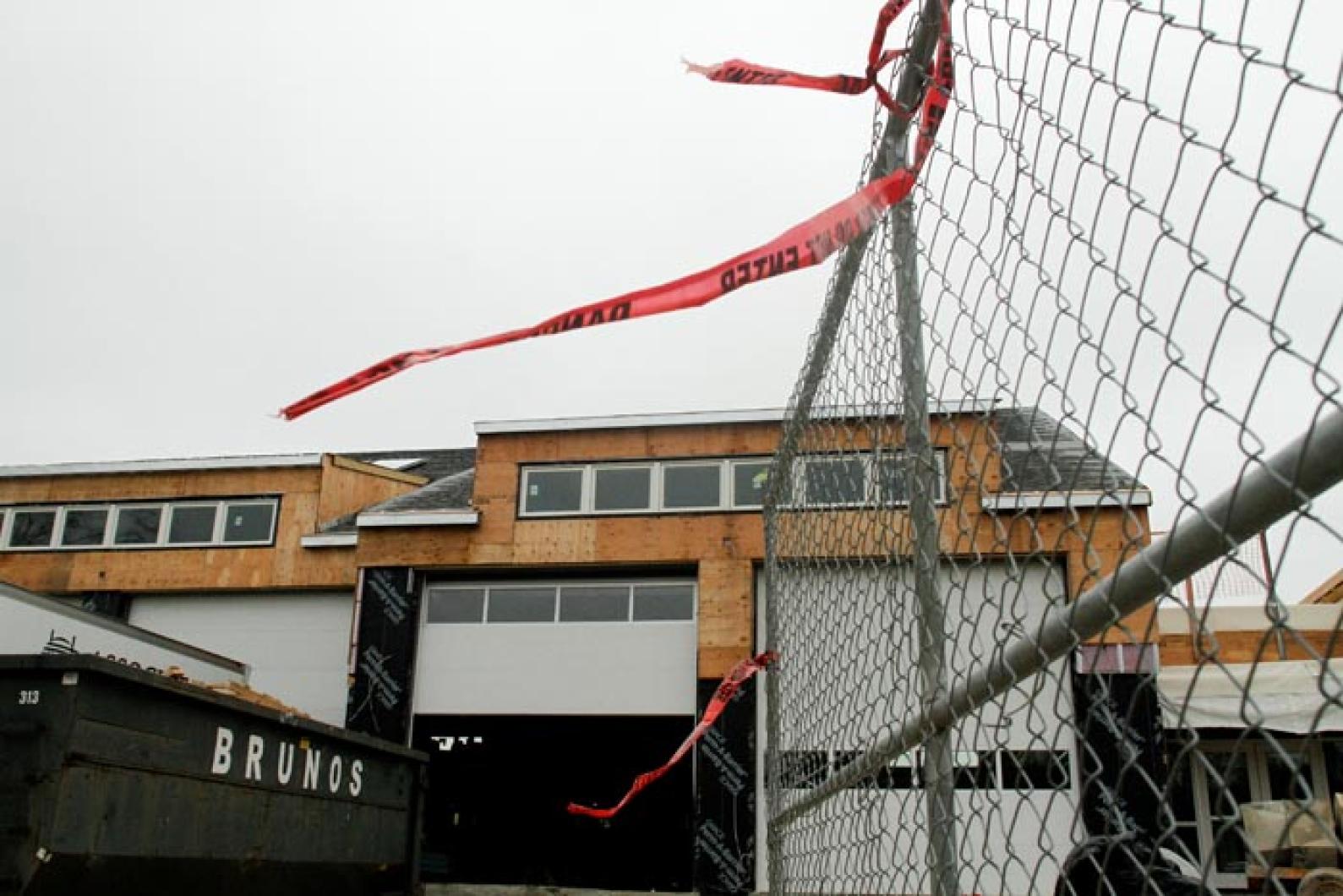The town of Tisbury will extend the contracts of the people overseeing work on its trouble-plagued new emergency services building, at a likely cost of around $100,000.
The extensions — for the architects, HKT, and owner’s property manager and clerk of the works — were ticked off by the selectmen on Tuesday night at a meeting with the building committee, called to discuss the allegedly shoddy workmanship by the main building contractor, Seaver Constructions, lengthening delays and increasing costs and frustration.
Tisbury fire chief John Schilling told the selectmen relations between the committee and the contractor now were “close to adversarial” at weekly meetings.
They were “fighting over nails and shingles,” he declared. “No one’s willing to give anything any more. They’re on one side, we’re on another, not even exchanging pleasantries.”
Work now is all but stopped on the Spring street project, at the order of HKT, following the receipt of a consultant’s report which found a long list of deficiencies with the work performed so far. The draft report details numerous problems, from misplaced foundations to faulty concrete slab flooring to misaligned, rusty and damaged structural members to faulty insulation and vapor barriers and other issues. Parts of the building will have to be removed and replaced, the report said.
Seaver now has commissioned its own consultant’s report. It was expected to have been ready for this Wednesday’s meeting with the building committee, but has been delayed until at least tomorrow.
Building committee chairman Joe Tierney said at the meeting it would be two to three weeks before the competing reports could be studied, reconciled and a plan formulated for how to proceed. The timing after that would depend on “how much they have to remove and replace.”
The new emergency services facility was originally due to be finished this week, but the completion date at this stage is unknown.
Mr. Tierney said the architects had already determined some of the issues raised in the report were incorrect.
“Specifically the report says there’s no ice and water barrier on the roof [but] there is,” he said.
The reason for the mistake, he said, was that the barrier was “unrecognizable” after months exposed to the elements.
Chief Schilling said the committee and the town were “heading into an entirely new area with this project.”
The two “massive volumes” which gave the contractor step-by-step instructions for the job did not deal with “taking the building apart and putting it back together again,” Mr. Schilling said, adding: “We’re really headed into an area where nobody that’s involved in this project has had experience before. And that’s a troubling area.”
When selectman Tristan Israel suggested that problems were “not a unique situation,” Mr. Schilling cut him off.
“Actually it is. According to all our experts who are working with us, none of the people involved with any of these firms has ever been in a situation like [this],” he said.
And costs are mounting.
“We just extended the contract with the architect. We just extended the contract with the project manager. And obviously we’ve had extensive legal services to date and we are going to have more legal services,” Mr. Schilling said.
Mr. Israel said if the company did not do a proper job, “they are breaching the contract, plain and simple.”
But Mr. Tierney said things are not that simple. For example, he said there is the question of which party pays for the inspection of possibly-inadequate work. If the inspection revealed no fault, he said, the town would have to pay. If fault was found, Seaver would pay.
Mr. Israel said he was losing patience with the delays.
“At a certain point we have to fish or cut bait,” he said. “It can’t go on like this interminably. I don’t get the sense that this is coalescing. I don’t want to bump along like this for another three months. It’s crazy.”
The town has to consider a Plan B, he suggested.
But the other two selectmen suggested that for now there was little the town could do except continue to cooperate with Seaver.
“If we cut bait, what Tristan wants to do, we’ll have this thing tied up for the next three years, in court,” said selectman Geoghan Coogan. “If we’re nasty about it, no one in this room’s going to be happy.”
Town administrator John Bugbee agreed. The committee had discussed its options at length, and was concerned “about getting legally involved and ending up in a worse situation,” he said.
Selectman Jeff Kristal took some comfort from the fact that the town now is talking directly with the president of the company, Scott Seaver, after a long period in which the town could get no direct response. And Mr. Bugbee suggested the town still had some negotiating leverage, which relates to a $1,000-per-day penalty that applies once the project goes past its deadline, early next month.
“They’re probably going to come to the board and ask for some relief on the time line,” Mr. Bugbee said.
That would present an opportunity to ask for other things in return, such as relief for the owners of abutting properties, who also attended the meeting to voice their frustration at the delayed project.
But for now, the bottom line, as summed up by Mr. Coogan at the end, is that the town faces a wait of several weeks before it can even begin to determine its next step.







Comments
Comment policy »